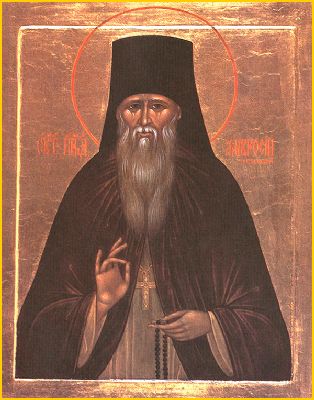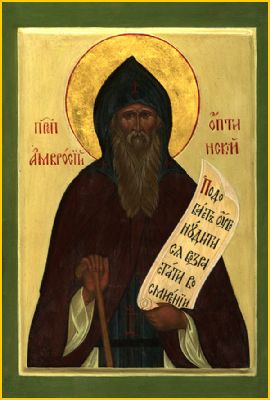|
|||
|---|---|---|---|
| This weekly bulletin insert complements the curriculum published by the Department of Christian Education of the Orthodox Church in America. This and many other Christian Education resources are available at http://dce.oca.org. | |||

Saint Ambrose of Optina lived from 1812 to 1891. The Russian novelist Fyodor Dostoevsky said that Saint Ambrose was the model for the character of Father Zossima in his novel "The Brothers Karamazov." The Optina Monastery was frequented by pilgrims and seekers because it was well-known for the wisdom of its spiritual directors. Dostoevsky came to the monastery in profound sorrow after the death of his young son in 1878. His meeting with Father Ambrose deeply affected him. But the novelist was only one of countless people who received spiritual nurture from Father Ambrose' loving words of guidance. Born into a priestly family, Alexander (his birth name) had a lively, outgoing nature and liked jokes and word play. He was bright, and did very well as a seminary student, but serious illness struck him just before graduation. He made a promise to God that if he recovered, he would become a monk. Perhaps it was his lighthearted nature that made him completely seem to forget his promise for quite a while after he regained his health. But one evening, an especially enjoyable one filled with laughter and good company, Alexander was struck by the superficiality of his life. The very next morning, telling hardly anyone, he set out for Optina. It was October of 1839. Alexander received monastic tonsure in 1842, and was given the name Ambrose in honor of Saint Ambrose of Milan. He was ordained to the priesthood in 1845, and served the Divine Liturgy with joy and reverence. Not long after, though, he again became ill, and in the years that followed his health continued to deteriorate. In spite of this he became the Elder of the monastery when the revered Father Macarius died in 1860 without naming a successor. By this time Ambrose was well-known throughout Russia as a spiritual guide, and so many people came to speak with him that they would wait in long lines. His schedule would have been fatiguing for a person in good health, but Father Ambrose was so ill that sometimes he had to receive people hour after hour while lying down, because he was too weak to get up. Yet he never turned people away, and always listened intently. Often he would tell people their own deepest thoughts, having seen into their hearts even before they said a word. 
In 1884, Father Ambrose founded the Shamordino Monastery for women near Optina. In 1891, visiting the monastery, he continued to receive those who wished to speak with him. But in the fall of that year his health failed completely, and he died. His funeral at Optino was attended by crowds of people and he was buried there. Father Ambrose left many good sayings. One which especially seems to reflect his thoughts about life is this: "We must live on earth just as a wheel turns, with only one point on the ground while the rest reaches out and upward." |
|||
